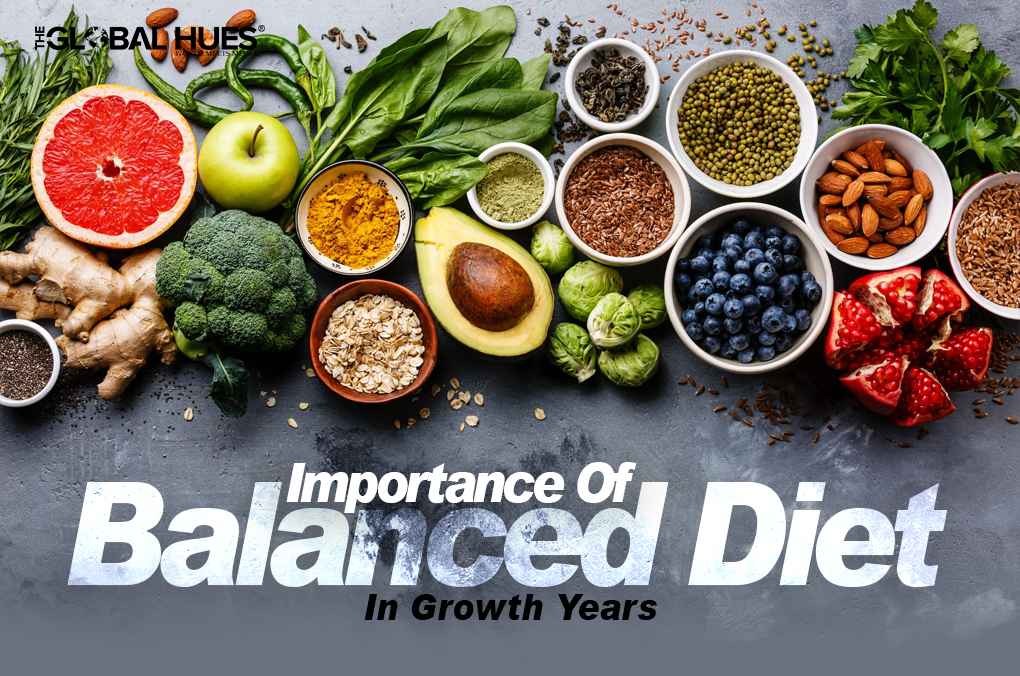Food is essential for the normal functioning of the human body as it has direct effects on the brain. Intake of healthy and nourishing diet should be a priority. A balanced diet can enhance problem-solving abilities, basic intelligence, optimize alertness, and improve behavior in children. A healthy diet helps in fighting common child illnesses. There are numerous reasons why a person should opt for healthy eating habits, one of the major one is to overcome any infectious agent. Many bacteria and virus are present around us. A healthy diet can ensure we don’t get infected with them. For that, we need to understand the importance of balanced diet.
During the first 36 months of a child’s life, the brain growth is continuous; grasping basic activities such as thinking, reacting and solving few problems like crawling, standing, walking, running and many more. Other activities like reading, listening to music, building with blocks together, playing games helps in encouraging brain development at an early age.

Brain food for child development
Foods rich in antioxidants, choline, omega-3 fatty acids, and complex carbohydrates are essential in boosting brain health in children. Including antioxidants in diet would be so much easier, if we know about the food-items that carry them. The amount of intake of every nutrient should also be in healthy proportions.
-
Antioxidants:
Antioxidants protects the cell membranes of the brain from damage and any kind of wear and tear in children. Brain is the most sensitive organ in Human body. It is also famous as the CPU of the humans. Every action and activity, from basic movement to complex thinking abilities can control and manage by our brain. This explains the importance of keeping it Healthy.
Present in: Blueberries, strawberries, raspberries, and blackberries. You can also find Antioxidants in other bright coloured fruits and vegetables. Fruits and vegetable are promoted healthy life as they are full of nutrients other than antioxidants. Nuts, seeds, and nut/seed butter are a rich source of the antioxidant vitamin E.
-
Choline:
Choline is an important nutrient for brain development and memory function in children. In form Acetylcholine, which is a chemical that helps in communication of the brain with the rest of the body, it plays a major role.
Present in: Choline found in eggs (especially the yolk), beans, Brussels sprouts, broccoli, cauliflower, yoghurt, tofu, buckwheat, and lean beef.
-
Omega-3 Essential Fatty Acids:
Omega-3 essential fatty acids are healthy fats, usually available in mother’s milk and fortified HiPP baby formulas. They are crucial for brain and eye development and helps stabilize the child’s mood.
Present in: Salmon, shrimp, scallops, walnuts, flaxseed, and omega-3 enriched eggs and yoghurt are rich in Omega-3 Essential Fatty Acids.
-
Complex Carbohydrates:
These carbohydrates are fibre-rich whole grains or starches. Complex carbohydrates are the main source of fuel for the brain and play an important role in the efficient functioning of the human brain. Complex carbohydrates are deduced into glucose by the body. This glucose is available for the brain as a source of energy. They maintain the whole process by using fibres in complex carbohydrates which helps in slowing the body’s energy absorption to ensures that the brain gets a slow and steady supply of fuel.
- Present in: Whole-grain bread, pasta, crackers, cereals, pancakes, waffles, and brown rice are rich sources of complex carbohydrates.

Essential nutrients for healthy brain development include:
- Proteins: Abundantly available in meat, poultry, seafood, beans and peas, eggs, soy products, nuts, seeds, and dairy.
- Zinc: Available in oysters and in fewer meats, fish, nuts and dairy.
- Iron: Available in meats, beans and lentils, fortified cereals and bread, dark leafy vegetables, and baked potatoes.
- Long-chain polyunsaturated fatty acids: Available in fatty fish, fish oils, and fortified foods.
- Iodine: Available in iodized salt, seafood, dairy products, grains and seaweed.
Vitamins for child brain development
Available in the liver, carrots, sweet potato, and spinach.
Vitamin D: Available in salmon, fish liver oil, milk. It is popular as the “sunshine vitamin,” because of its abundant presence in sunlight.
Vitamin B6: Available in the liver and other organ meats, fish, potatoes and other starchy vegetables, and non-citrus fruits.
Vitamin B12: Naturally available in animal products such as meat, fish, eggs, and dairy.
Parents should carefully choose a healthy and balanced diet for children’s body and brain to ensure wholesome development. Intake of above-mentioned foods can improve brain function, memory, and concentration in children.
Also Read:




